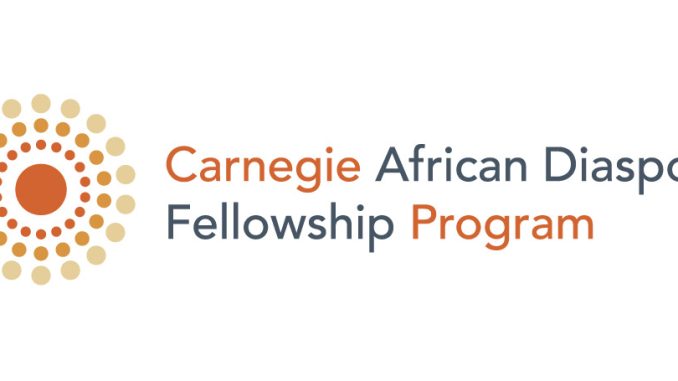
The Carnegie African Diaspora Fellowship Programme (CADFP) is a scholar fellowship program that supports educational projects at African higher education institutions and African scholars living abroad can apply for it. The program is funded by a grant from the Carnegie Corporation of New York (CCNY) and is offered by IIE in collaboration with the United States International University-Africa (USIU-Africa). Over the program’s first two years, 110 short-term faculty fellowships for African-born academics were supported by the CADFP.
The program is a prime example of CCNY’s ongoing dedication to higher education in Africa. The program, including applications, project requests, and fellowships, is managed and administered by IIE.
Eligible Project Activities:
- Curriculum co-development
- Research collaboration
- Graduate student mentoring and training
About the Institute of International Education (IIE)
The Institute of International Education was founded in 1919 with the belief that global education may contribute to a more secure and just world. Through the initiatives we oversee, we now impact the lives of over 29,000 people annually across 180 countries, assisting in the education of the next generation of leaders and providing a lifeline to the most vulnerable students, scholars, and artists worldwide. We offer our gratitude to our partners, donors, and higher education institutions who share our vision for strengthening international relations as we look forward to the next 100 years of IIE.
It is a great privilege for us to oversee the Hubert H. Humphrey Fellowship Program, the Benjamin A. Gilman International Scholarship, the Fulbright Program, and the International Visitor Leadership Program (IVLP) on behalf of the U.S. Department of State’s Bureau of Educational and Cultural Affairs (ECA). In addition, we provide support for ECA’s Education USA network.
We collaborate with the US Department of Defense (DoD) on projects like Boren Awards and The Language Flagship. By encouraging language acquisition, these initiatives help to improve international communication between the US and other countries. To support democracies and touch and enhance countless lives, IIE works with a variety of foundation, corporate, and governmental partners, including the United States Agency for International Development (USAID).
You are giving students and academics all around the world options that could change their lives by sponsoring IIE.
Carnegie African Diaspora Fellowship Program
Application Deadline: 4th March, 2024
Country to study: Ghana, Kenya, Nigeria, South Africa, Tanzania, Uganda
Type: Fellowship
Sponsor: Institute of International Education
Gender: Men and Women
Aim and Benefits of Carnegie African Diaspora Fellowship Program
For the fellowship, the African Diaspora Fellow will receive
1. A daily stipend of $150 w
2. Cost of a visa, if applicable
3. Supplemental medical insurance
4. The price of round-trip international airfare and ground transportation from the scholar’s residence to the airport in North America
5. Possibilities to apply for additional funds to pay for participation in workshops and knowledge development activities.
Requirements for Carnegie African Diaspora Fellowship Program Qualification
To be eligible for the Carnegie African Diaspora Fellowship Programme, a scholar must:
- Have been born in any African country, as evidenced by the biographical data in the scholar’s passport;
- Be a resident of Canada or the United States;
- Possess a terminal degree; and
- Work for a college or institution that has earned accreditation.
Academic rank is not a barrier for scholars; postdocs are not.
Scholars should provide personal statements, details about their academic background, disciplinary expertise, and administrative experience with their application. It is necessary to obtain a letter of reference from the scholar’s current institution’s dean, or an administration at the same or higher level.
Interview Date, Process, and Venue for Carnegie African Diaspora Fellowship ProgramSelection Criteria of Project:
- Specific activities are proposed to collaborate on research, co-creation of curricula, and/or teaching, training, and mentoring of graduate students.
- The project exhibits innovation and is supported by sound project concepts and rationale.
- The project request outlines the institution’s prior work on the suggested topic or topics, the host institution’s resources, the problem to address, the desired changes or improvements, any gaps, and the precise role the Diaspora Fellow is expected to play in the suggested activities.
- A precise mission for the host institution’s project visits is stated, along with a rationale for working with a researcher from the diaspora partner on the initiative.
- The discipline, subfields, areas of expertise, experience, and application motivation of the suggested scholar are all highly appropriate for the project’s success and impact.
- The recommended scholar’s relevant experience is demonstrated in each requested project activity.
- The project’s proposed impact must be feasible.
- An explanation of how the project visit’s initial impact will be measured or how it is intended to contribute to wider goals is included if the potential impact of a longer-term project will take longer to be realized or evaluated.
Application Deadline
The application closing date is March 4, 2024
How to Apply
- Interested and qualified? Go to Institute of International Education (IIE) on www.iie.org to apply
- Applications are continually being accepted by the CADFP for the scholar roster.
- The Project Requests application period began on January 4, 2024, and it ends at 11:59 PM EST on March 4, 2024.
- To apply, visit https://www.onlinesubmissionportal.com/adf .
To get updates and be added to the program contact list, send an email to [email protected] - In addition to reviewing the information below, scholars should familiarize themselves with the process of submitting a project by a prospective host institution in Africa.
DOWNLOAD SCHOLAR APPLICATION GUIDELINES
For more details, visit the IIE website.

Leave a Reply